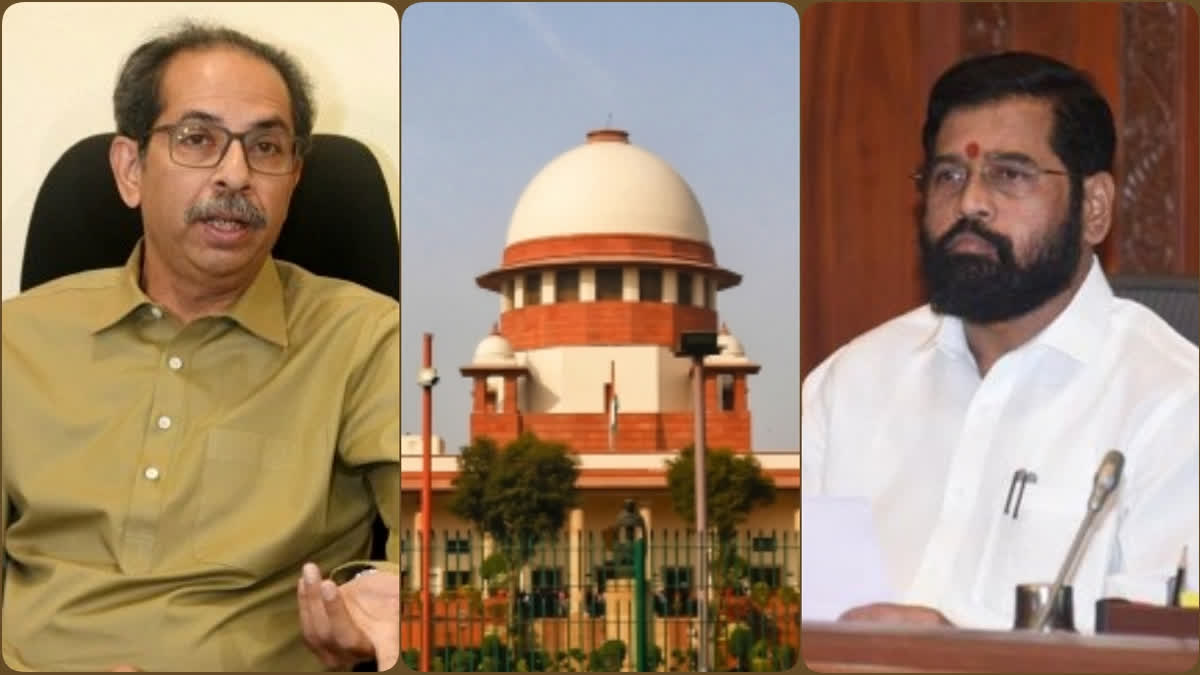New Delhi: In a relief to the Eknath Shinde government in Maharashtra, the Supreme Court on Thursday said Uddhav Thackeray can not be reinstated as the Maharashtra Chief Minister because he resigned from the post.
A Constitution Bench pronouncing the verdict in a plea seeking disqualification of Shinde faction MLAs, who engineered the fall of Maha Vikas Agadhi government in Maharashtra, also said that the appointment of the Speaker by the Eknath Shinde camp of the Shiv Sena was illegal as it did not abide by the whip issued by the party. It also ruled that the Governor was at fault as he should not have misused the mechanism of 'floor test' to resolve intra-party differences. However, it said, since former Chief Minister Uddhav Thackeray voluntarily resigned from his post, the Shinde government would face no threat as of now.
The five member Constitution bench however referred the case to a larger seven member Constitution bench. The bench stated that the 2016 Nabam Rebia case, which held that Speaker cannot initiate disqualification proceedings when a resolution seeking his removal is pending, requires reference to a larger bench.
The Supreme Court pronounced that the Governor was at fault as he had no 'objective material' to call for a Floor test in the Assembly. Floor test cannot be used as a medium to resolve inter or intra-party dispute, the court added. The resolution relied on by the government did not indicate that MLAs wanted to withdraw support, the CJI said adding that even if it is assumed that the MLAs wanted to exit the government, they constituted only a faction.
CJI Chandrachud reading out the unanimous judgement said that the issues such as whether a notice to the removal of the Speaker will restrict the powers of the Speaker to issue disqualification notices need examination by a larger bench.
The five member Constitution Bench comprising Chief Justice of India D Y Chandrachud and Justices M R Shah, Krishna Murai, Hima Kohli and P S Narasimha reserved its verdict on March 16.
During the hearing, the CJI wondered how to reinstate the Thackeray government even if it finds fault on the Governor's decision to call for a floor test. This was because, the bench said, Uddhav Thackeray had accepted that his government is in minority and then resigned.
On the Governor’s role, Chandrachud asked what had suddenly prompted the Governor to take such a decision and whether he had examined why so many party members from the ruling 'Shiv Sena' arrive at such a step after enjoying the 'fruits of power' for three years. The court also asked about his rationale in announcing a floor test. He suggested that a no-confidence motion could have been brought about instead, by asking the lawmakers to float it.
"Why should a government which has been formed and in respect of which there was absolutely no disquiet earlier be asked to suddenly face a trust vote?” he questioned. The Thackeray faction of the Shiv was urged to refer the matter to a larger bench.
In 2016 in the Nabam Rebia case, it was decided that the Speaker of a House cannot decide a disqualification petition filed under the anti-defection law while a notice under Article 179(c) is already in place. The court said that Uddhav's prayer cannot be considered in the abstract and the court needs further time to determine along with the facts of the petitions.



